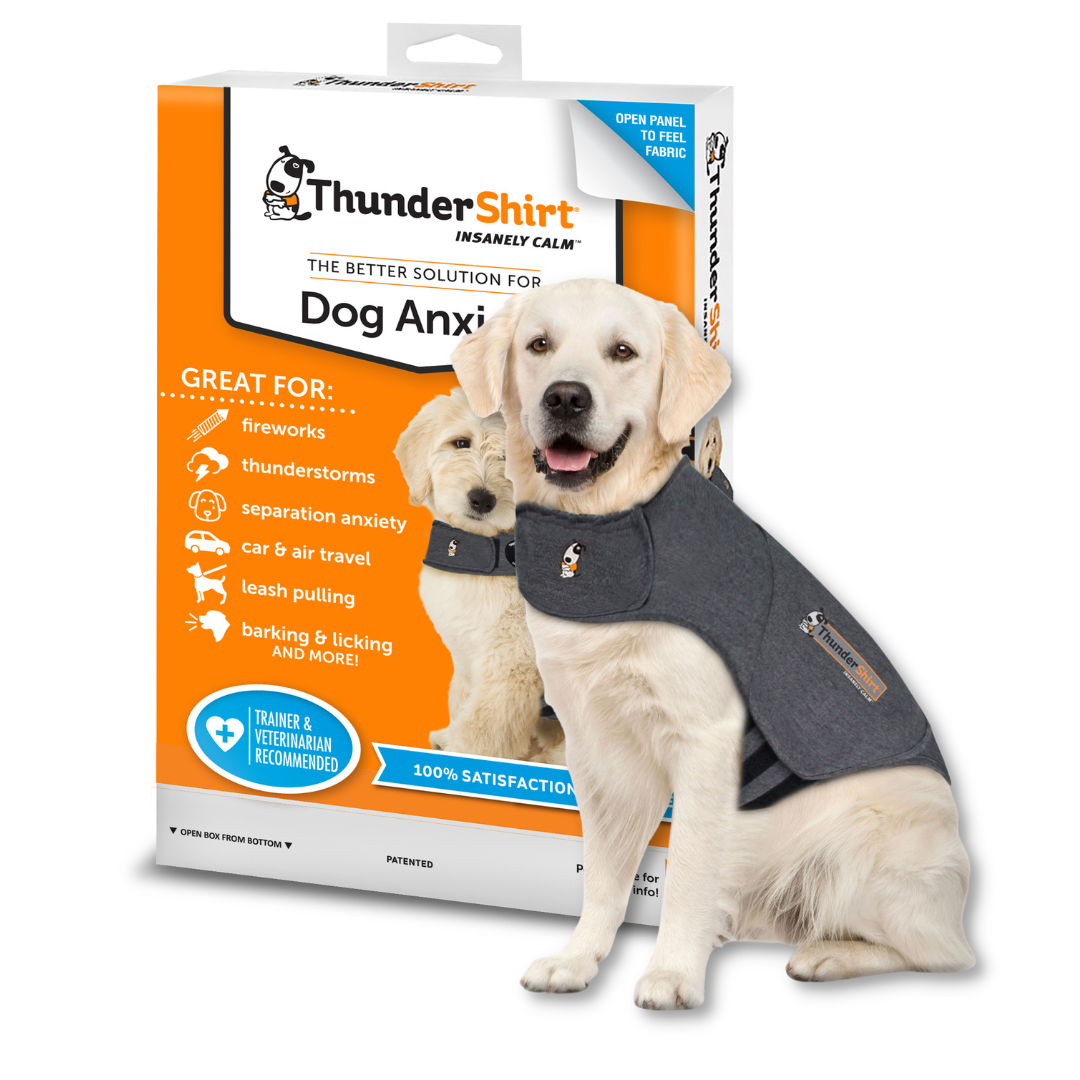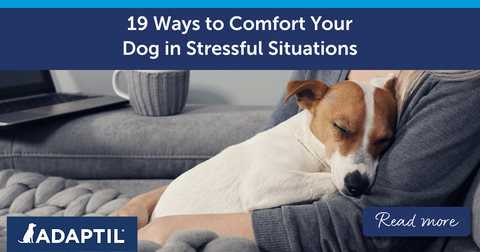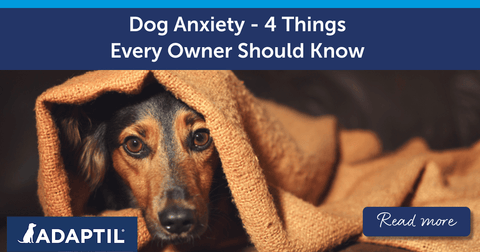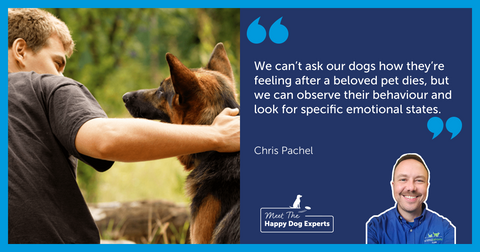Want to subscribe to our blog?

How Long Do Dogs Live, and How Can I Support My Senior Pooch?
Written by Adaptil, published on April 18, 2023
Welcoming a new dog into your family, whether they are a puppy or an older dog, is an exciting time and they will become a wonderful companion for years to come.
But for how long will you have their companionship? There is no way to answer that definitively, but averages are known for many breeds, as are some of the factors that can impact a dog's lifespan.
The Royal Veterinary College (RVC) in the UK recently undertook a study using analysis from a random sample of 30,563 dogs that died between 1st January 2016 and 31st July 2020. This study included 18 different breeds and crossbreeds. The results revealed the overall average life expectancy at age 0 for UK companion dogs was 11.2 years.
There are many different things that can affect a dog's lifespan; their general health, nutrition and exercise can all have an impact, but on average:
- Small breeds can live up to 14 years
- Medium breeds can live up to 13 years
- Large breeds can live up to 13 years
There are always exceptions, of course, such as Australian cattle-dog Bluey, from Victoria, Australia. Still the Guinness World Record holder for 'Oldest Dog', Bluey reached the grand age of 29 years 5 months.
How long do dogs live?
There is an outdated assumption that 1 human year = 7 dog years, but it is now felt that it is more complicated than that and that although year 1 of a dog's life = 15 years of a human life, year 2 is equivalent to 9 human years and each year thereafter is equivalent to 5 human years.
How to convert dog years to human years
The American Kennel Club has provided a very useful guide, taking into account the size and weight of a dog, and indicates an average life expectancy in human years for each.
In addition, research from the Royal Veterinary College suggests that female dogs have a slightly greater life expectancy than male dogs (11.41 years : 11.07 years), and that a Jack Russell Terrier's life expectancy averaged 12.72 years, whereas a French Bulldog's life expectancy had the shortest life expectancy at 4.53 years.
This concurs with its findings that flat-faced breeds have the shortest life expectancy due to the life-limiting disorders their conformation brings.
What else impacts a dog's life expectancy?
It is important to note that the above values are average; every dog is individual and there are other things that can also impact their lifespan:
- HEALTH: Regular exercise has a great impact on a dog's general health. It not only helps keep them in shape, it is equally important for their mental health. Fit, active dogs are much less likely to suffer from problems such as arthritis, obesity and behavioural issues.
- NUTRITION: Like humans, dogs need the right mix of nutrients in their diet to keep them healthy and help them to combat doggy illnesses. Water, carbohydrates, protein, fat, vitamins and minerals are all essential ingredients of a dog's diet.
- MENTAL STIMULATION: As well as regular exercise, playing games, training and encouraging your dog to solve puzzles will all contribute to a healthy doggy mental state. Not enough mental stimulation can lead to boredom, frustration, anxiety and depression. Learn to recognise the signs that your dog may be struggling and take steps to keep them mentally stimulated.
- NEUTERING: Neutered dogs generally have a longer lifespan but, according to the RVC Study, it seems that the effect is greater in females than in males.
How can I support my senior pooch?
Depending on the breed, middle age is generally considered to be above 7 years of age. You will probably start to notice some changes in your dog's behaviour around this time; their sleep patterns might change, they may become more anxious and more vocal, or you may notice they are becoming less tolerant and more destructive.
These are common traits in an older dog, but you can support them by:
- Making sure they have somewhere quiet to retreat to and rest, and where they won't be disturbed.
- Make sure their bed is away from draughts and easily accessible i.e. they don't have to climb into it.
- Provide plenty of comfy blankets, and perhaps a heated pad to help any sore joints.
- Be aware that they may want to toilet more frequently but make sure you liaise with your vet if they begin to have toilet accidents around the house as there may be a medical reason.
- Make sure floor surfaces are not slippery put down rugs or carpet runners on smooth flooring to give your dog some extra grip
- Try and keep everything accessible for your dog, e.g. access to food and water. They may need more water bowls around the house for easy access. Slightly elevated food and water bowls can be useful so that your older dog won't need to bend their neck so much.
- Make sure they have their favourite toys handy.
- Ramps or steps can be useful to get onto elevated places, such as their favourite couch or into the car.
- Keep your ADAPTIL Calm Diffuser in operation to help maintain reassurance in your home.
- As your dog grows older, their dietary requirements may change so make sure you speak to your vet for advice on their diet so that you can maintain the correct daily amount to feed and a healthy body weight and body condition score.
- Be aware that changes in their sight or hearing may mean that your dog startles more readily. Try to keep some familiarity to routes/places you visit if you think your dog's senses are deteriorating, as new things may be more worrying for them. If you find this is the case, try an ADAPTIL Calm collar which will help your dog to cope with the many sights and sounds they may encounter outside of the home.
- Adjust their activities accordingly. Older dogs still need regular gentle exercise and mental stimulation, but you may need to give them shorter, more frequent walks, shorter training sessions, reduced impact games (e.g. rolling a ball along the floor rather than getting your dog to jump up and catch a ball mid flight). Using more scent-related games and activities, and puzzle feeders/snuffle mats will help to keep them mentally active too.
- Try different forms of exercise. If your dog likes the water, try hydrotherapy/swimming; or perhaps they would enjoy a massage.
- Consider different routes for walks to keep it interesting, but walk at your dog's pace.
- Consider the impact of the weather. Going out in extreme heat or in winter weather could impact their health. In the summer months, only take them for a walk early in the morning or in the evening when it is cooler. In the winter, consider a doggie jacket and make sure you check their coat and paws for snow and ice when you return. If it's really cold, they may be just as happy to stay indoors and play games with you.
- If you have to walk a distance to get to their favourite park, consider driving there so that they will get their stimulation and enjoyment at the park, and won't get tired getting there.
- Even though they might like to wander around the park on their own, you may have to consider using an extending lead so that you are able to encourage them, assisted with recall, back to your side if necessary.
- If they are pavement walking less frequently, their nails may not be as short as they would be with more exercise, so they may require regular trimming by you.
- Build in some extra 'me' time to continue the bond you have developed with your pooch over the years.
- Health checks at least every 6 months are advised for older dogs; this allows early detection of problems and easier management of them. Don't forget to mention any changes you have noticed to your vet at these sessions, and always keep up with regular preventative healthcare to help your dog stay healthy!.
Whatever your dog's life expectancy, caring for them from a puppy until they grow old is always rewarded by their loyalty and companionship, so enjoy the wonderful life you will have together.
Following our expert tips will help to ensure your bond with your dog goes from strength to strength.
Make sure to join our community for weekly advice from our dog behaviour experts as well as product offers and competitions.
 Related Posts
Related Posts
Legal notice The information collected is intended for Ceva Santé Animale and the group in order to manage your requests. This information can be shared with service providers in order to organize their management. In accordance with the General Data Protection Regulations, you have the right to access, rectify and limit the processing of your data. You can also, in certain cases, object to the processing, withdraw your consent and request the deletion and portability of your data. For any request in relation to your personal data, please visit this page.



































